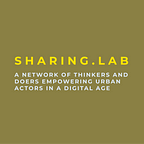Let’s stop talking about smart cities
Smart cities have been a mega trend for several years now and their prospect for growth is still huge.
According to the latest projections, the market is expected to grow by 20% per year from over $300bn in 2015 to over $750bn in 2020. In the EU-28 only, 240 cities have “significant and verifiable smart cities´ activities” (Mapping smart cities in the EU). Yet, despite this interest, there is still no clear agreement on what the concept actually means.
A brief history of smart cities shows an evolution in the main focus areas, and the current Smart City Expo in Barcelona highlights where urban actors stand now. The first phase of smart cities was largely driven by big tech companies, such as Cisco and IBM, with a focus on “city operating platforms” (in B. Boorsma (2017): A new digital deal, Rainmaking publications, pp.139). Since then, municipalities have realised that they should use digital technologies, data and the new economy to improve people’s quality of life in cities.
There is no doubt that great progress have been made, but there is still a huge gap between the official narrative around smart cities and their appeal for citizens. In France, the recent study by Chronos and Obsoco is clear: people do not want to live in smart cities.
This does not mean that inhabitants don’t want their cities to be green, their administration to be efficient, the local economy to be thriving,… or other agendas that smart city strategies put to the fore. But cities need to change the narrative. “Smart cities”, as an expression, does not reflect people’s vision for a livable urban future. This is a serious matter as the incapacity to build the right narrative, can be a barrier to gather all forces and energies to actually build the city we all want to live in. We need to put words on a desired vision to gather our forces around.
Let’s use a very simplistic comparison to make our case even clearer. I just come back from a 5 weeks’ trip to the US and Canada, where I visited family and friends in Chicago, Detroit, Toronto, Boston and New York. Imagine if all I would tell you about this trip was the air quality in the plane, the speed of the car, how easy or difficult it was to park, the cost of the subway ticket,… This is not to say it is not important. It is very important. But this is probably not what will make you want to go there. Wouldn’t you rather hear about the great people I met, the amazing places I have visited, the fantastic food I ate?
It is the same for cities. Hearing about their infrastructures and data is not what will make people dream. And do they need to dream? Yes! Because it is this dream of a better urban future that can give us the energy, will and the power to build it.
The good news is that urban actors have a great pool of resources upon which to build this new narrative. While the smart city’s narrative is very dull, the inventiveness of daily urban practices is fascinating and discourses around local neighbourhood and local life are very strong.
As the Chronos and Obsoco study highlights; 23% of French urban dwellers are for example engaged in some activities around self-production of food and there is a growing appeal for practices such as urban farming... Apps and services like Kiez App in Berlin, Nextdoor in the USA or Peerby, which started in the Netherlands, seek to strengthen local activities and social interactions. New ways of living and working are growing where common areas, resources and activities are central. The renewal of local services, the quest for authenticity and uniqueness are spreading in cities all around the globe and technology makes it possible for services to be both hyperlocal and scalable.
The Everyone and Everyday project in Barking and Dagenham (UK), led by the Participatory City Foundation, is a good example of the power of local initiatives. The neighbourhood programme works with local residents and businesses to grow a network of 250 projects, ranging from community cooking, to walking busses for kids, business development programs or playstreets initiatives. The goal is to “improve the overall well-being of the neighbourhood, leaving no one behind.”
The diversity and creativity behind these initiatives show people’s desire to take control of their urban future and be part of the solution. Though the same trends are spreading in big cities all around the globe, they are embedded in unique contexts, geographies and cultures. Building a strong narrative for smart cities, requires for urban tech actors to be present at the local level, to collect all these local narratives and to make powerful and socially embedded discourses emerge out of them.
So, let’s stop talking about smart cities. Let’s start building a new narrative that emerges from our cities’ uniqueness and inventiveness. Tech is there, like electricity, but it is not a vision in itself.
What should the new narrative for Copenhagen be? On which local specificities should it be built? Please share your ideas, pictures, anecdotes, or whatever other materials, so we can jointly shape the vision for a desirable urban future.
Psst: We will launch a project to support the creation of a new narrative. Send us your email if you want to be the first to know about it :-)
Looking forward to hear from you!
Caroline
